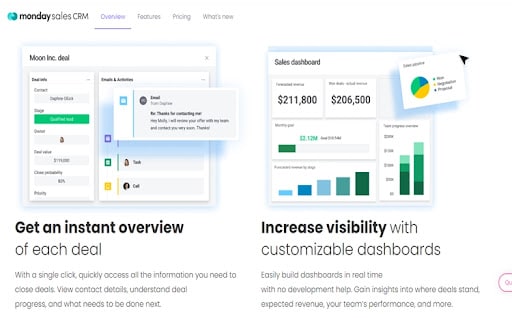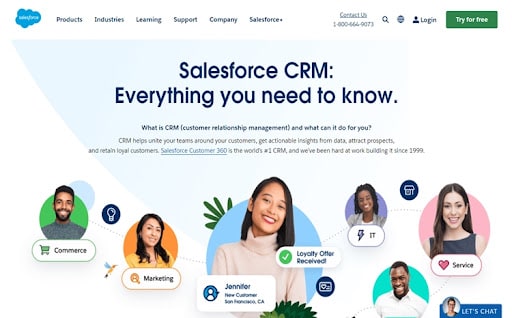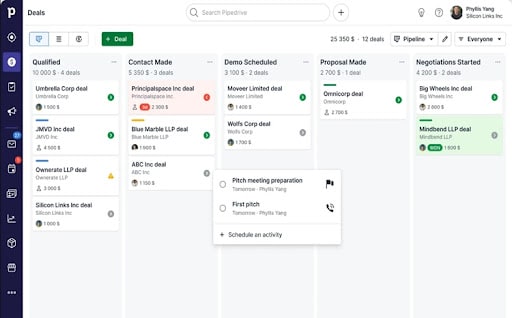


- Save resources with no-code customization
- Build dashboards for better predictability
- Close faster with AI tools at every stage
- Powerful integrations



- Get 40% off when you buy
- Easy setup with built-in guidance tools
- Marketing, sales, commerce & more in one suite



- Full access, no credit card required
- AI powered automations that save time
- Easily schedule & customize sales actions




- Logical, user-friendly interface
- Up-to-the-minute sales updates
- A top CRM system for fast growing businesses



- Multiple AI-powered automations
- Over 750 integrations
- Free expert assistance included



- All-in-one tool with invoicing, payments & AI
- Great for service-based small businesses
- 7-day free trial



- Easily track sales and leads
- Create custom sales pipeline views
- Analyze data for customer insights



- Manage sales through a visual sales pipeline
- Multiple user-friendly sales dashboards
- Free 14-day trial
There are several types of CRM software on the market providing different solutions. The most common types are analytical, collaborative, and operational CRM systems. Analytical types focus on reviewing customer data to gather insights and spot customer behavioral trends. An example would be Salesforce CRM.
Collaborative types focus on connecting sales reps and other departments and granting them access to up-to-date customer data to guide their decision-making. Monday.com is an excellent example of an all-in-one solution, with sales, CRM, and project management tools available.
Operational CRM types help to streamline customer relationships and the buyer journey and offer automation for marketing campaigns and other features. Hubspot is an industry-specific example of an operational CRM.
How Much Does CRM Software Cost?
On average, CRM Software costs begin around $10 per user per month and can rise to much higher, up to $30+ per user per month.
There are several factors that may affect this cost. Some CRM vendors require that you pay a mandatory fee for onboarding, others charge to remove contact list limits, others put a premium on customer support, and others charge to unlock additional features. Implementation costs may be calculated separately, which makes packages more expensive. Another factor taking the price higher will be if the minimum user requirement has more users than your current number of employees.
You can usually lower your CRM software expenses by paying annually, which will have a lower per-month and per-user cost. You can also take advantage of discounts and special offers or opt for a custom CRM package with only the tools you need.
Tips for Choosing the Right CRM Software for Your Business
Choosing the right CRM software for your business can feel overwhelming due to the many available options. Here are some tips that may make the decision easier.
Define your goals and needs
Figure out what your business aims to achieve, such as funneling more prospects or automating your marketing. Consider whether your organization needs a scalable software that can grow with the company, or one that suits small businesses in a local area with no expansion plans.
List the features and technologies you require
Review your business needs to find the CRM software with the outstanding features and technologies you require. Make a list of what features would be most helpful to your business and what you can live without, and shop based on your list. Online reviews and referrals can help you make a decision.
Choose based on which departments will be using the CRM software
Different CRM software will have features that work well for different departments, be it the sales team, the marketing team, project management, etc. Make sure to choose software with tools that are relevant to the correct departments.
Consider third-party integrations
Third-party integrations elevate CRM software by providing additional features and management tools. Your analysis of your business and needs will let you know which applications to add to your software for effectiveness and a more seamless experience. Integrations with tools you are already using may be especially helpful.
Factor in the cost of the CRM software and integrations
CRM software is available at various price points with different feature sets. Once you determine what your business needs, you’ll be able to check whether your budget can deliver the features you want. Otherwise, you can opt for a custom or pared-back option.
Don’t forget customer support
A breakdown in your CRM system can cost you customers and revenue. Therefore, you can’t wait days to get a response from your CRM provider. Search for a company that offers adequate training, a knowledge base, live chat, and 24/7 customer support.
Important Features to Look For in a CRM Solution
The best CRM software should have the following features.
Customer and lead management
These essential tools enable you to store customer details and contact data, check their history and purchases, and view their interactions with sales reps.
You can also use searchable databases to find and review customer data before meeting them, enhancing customer service. Finally, you should be able to identify, qualify, and guide prospects throughout the buyer’s journey.
Third-party integrations
Additional features can enhance CRM systems and improve efficiency for your team. Common options include email integration, project management tools, and connections to related company systems, such as Point-Of-Sale (POS) platforms. CRM software may also enable you to connect social media channels to your system.
Automation
Top CRM software saves time for your employees by automating workflows and streamlining your company’s operations. You’ll get marketing automation, automated data collection and analysis, lead follow-up through email campaigns, and more, which make it easier to guide the customer through the sales funnel.
Sales management
Sales teams should be able to view customer profiles, update details, track their interactions, and convert high-quality prospects into customers. The best CRM solutions provide information for sales forecasting to determine whether your efforts match the output you’re getting. These tools may also track calls and log time spent on a prospect.
Analytics
CRM software analytics should provide valuable reports after automatically collecting customer data and tracking sales activity. The insights are likely to show sales team output, sales reports, and data on past marketing campaigns.
Furthermore, you should be able to identify customer and sales management weaknesses, forecast revenues, and create customizable dashboards to visualize insights more simply.
How Did We Choose and Rate the Best CRM Software Tools?
We signed up to review each CRM software independently and put each one through its paces. We rated the best CRM tools using several criteria, with Pipedrive emerging as the best overall for user-friendliness and value for money. What we looked at included the following.
Pricing: Whether the CRM features are worth the price
Ease of use: Whether the software is suitable for beginners and advanced users
Customization: Whether the software can be tailored to your preferences
Features: Whether the software has extensive options and third-party integration capabilities
Implementation: Whether the software is easy to understand and apply
Customer Support: Whether the CRM vendor offers comprehensive customer support, live chat, and other training resources
Free trial: Whether you can access a free trial to test the product
Why Your Business Needs CRM Software
No matter the size, every business needs CRM software to manage its most valuable asset: its customers. Here are some of the benefits you’ll get from a CRM system.
Improved Customer Relationships
CRM software helps you record a customer’s contacts and information, making it easier to personalize your interactions and customize the solutions you provide them. These connections will breed loyalty to your brand and increase customer retention.
Customer service will also improve, since you can get insights and feedback on what is and isn’t working.
Increased Sales and Revenues
CRM systems increase sales by gathering customer data automatically, automating responses, and easily capturing details from potential leads, and directing them through the sales funnel.
Moreover, sales reps can collaborate with other departments to get more information about a customer, which may help them close more deals. Customers’ orders and purchases are also recorded by the system to be used for marketing purposes.
Advanced Reporting
Most CRM software analyzes the data it collects to provide insights and reports on the state of your business. These reports make it easy to visualize your company’s operations and where there are weak points or opportunities for more revenue.
Manual and Automated Marketing Tools
Marketing teams benefit from CRM software because it contains tools for planning and executing marketing and email campaigns. Automation capabilities can further enhance these campaigns, working around the clock to generate leads and guide them to the sales funnel. Sales data insights and customer data reviews can deliver a higher conversion rate.
Streamlining Operations
CRM software helps cut operational costs by performing repetitive tasks seamlessly, saving employees time to focus on more important tasks. The software enhances mobility by offering mobile solutions, enabling your company to serve customers from anywhere.
Finally, CRM systems can help make your company agile through the digital enhancements they provide.
How to Integrate CRM With Your Existing Systems
The best way to integrate CRM with your existing systems is by using Application Programming Interfaces (APIs). These are tools that act as a bridge for two software to connect and transfer information.
Some CRM software, like Pipedrive, offers a marketplace where you can download APIs for email integration, communications and messaging, video calling, accounting, lead generation, and more.
Summary
The variety of CRM options makes it challenging to select the best one. Our review provides several choices and unique selling points, with Pipedrive as our top contender.
Consider the tips on how to choose a CRM for your business and select the option that closely matches your needs. Through free trials and some research, you’ll be prepared to find a CRM solution that will integrate seamlessly with your company.
Our Top 3 Picks
- 1exceptional9.7
 Customizable CRM option for businessesCustomizable CRM option for businessesRead monday sales CRM Review
Customizable CRM option for businessesCustomizable CRM option for businessesRead monday sales CRM ReviewGreat for - Small to midsize businesses who need more than spreadsheets
Price - $8 per seat per month (3 seat minimum)
Free trial - 14 days
monday sales CRM makes it easy to get started with ready-made templates. You can customize almost anything to your needs without any IT help necessary. The seamless Gmail/Outlook integration means you can communicate with clients in one place, as well as log and track all your activities with them.
The platform is super intuitive but also capable of handling any complex processes, whether it be sales, project management, tasks, and more. monday sales CRM saves you time by automating manual work.
monday sales CRM Pros & Cons
PROS
Integration with most tools you useAutomations eliminate manual workHandle tasks & projects in one platformCONS
Price can be an obstacle - 2excellent9.4
 Top customer service and relationship tools30-day Free TrialRead Salesforce Review
Top customer service and relationship tools30-day Free TrialRead Salesforce ReviewA fully packed, cloud-based, scalable CRM with market recognition and a loyal user base, Salesforce has plenty going for it already. And it keeps evolving, which is one of the reasons it sees little turnover in companies once they embrace it. This powerhouse CRM offers a substantial advantage and many appealing features, one of them being the slate of add-ons that allow it to grow with whatever business is using it.
Salesforce offers every sales tool you can think of as well as a dynamic web of products that essentially allow you to customize your experience and scale the technology with your company’s growth. It features AI-backed lead scoring, a built-in communication tool called Chatter, and integrated invoicing, as well as the capacity to connect clients’ custom apps via Heroku cloud to the market. Add that to the array of standard sales, CS, and marketing tools and you can see why Salesforce is often the go-to CRM for larger companies.
Salesforce Pros & Cons
PROS
Highly customizableScalable without limits—usable by the largest organizationsLarge app ecosystem, over 3000 apps available.CONS
Expensive compared to the competitionComplex, can be difficult and expensive to set up - 3very good8.9
 All-purpose CRM to support businessesFree TrialRead Pipedrive Review
All-purpose CRM to support businessesFree TrialRead Pipedrive ReviewGreat for - First-time CRM users
Price - Starting at $14.90
Free trial - 14 days
Another accessible CRM tool, Pipedrive fills in the gaps left by Monday and other competitors in its field, namely with lead-tracking and other sales-based reporting tools.
Pipedrive offers a simple yet sophisticated interface that more than makes up for it with its ability to represent the sales process in graphic form. It is a worthy tool for keeping track of contacts, improving communication both within and outside of the team, and keeping close tabs on sales and possible deals. Add in automated call tracking, a popular chatbot feature, and a ready-to-use platform, and you have a CRM tool that offers a solution to most of the needs of small- to medium-sized businesses.
Pipedrive Pros & Cons
PROS
Great for lead trackingPopular chatbot toolStrong mobile capabilitiesCONS
Not ideal for larger businessesNo native helpdesk creator